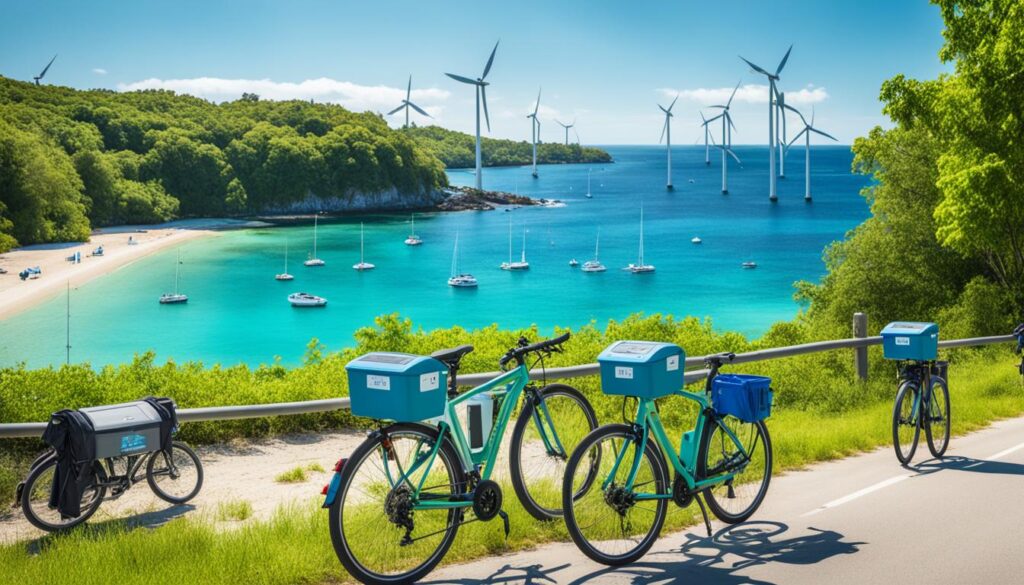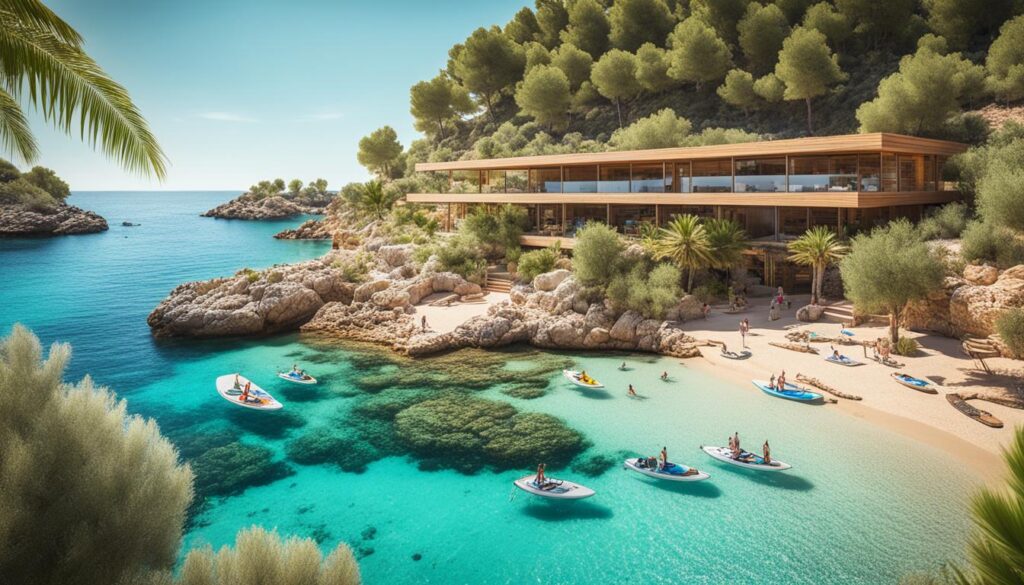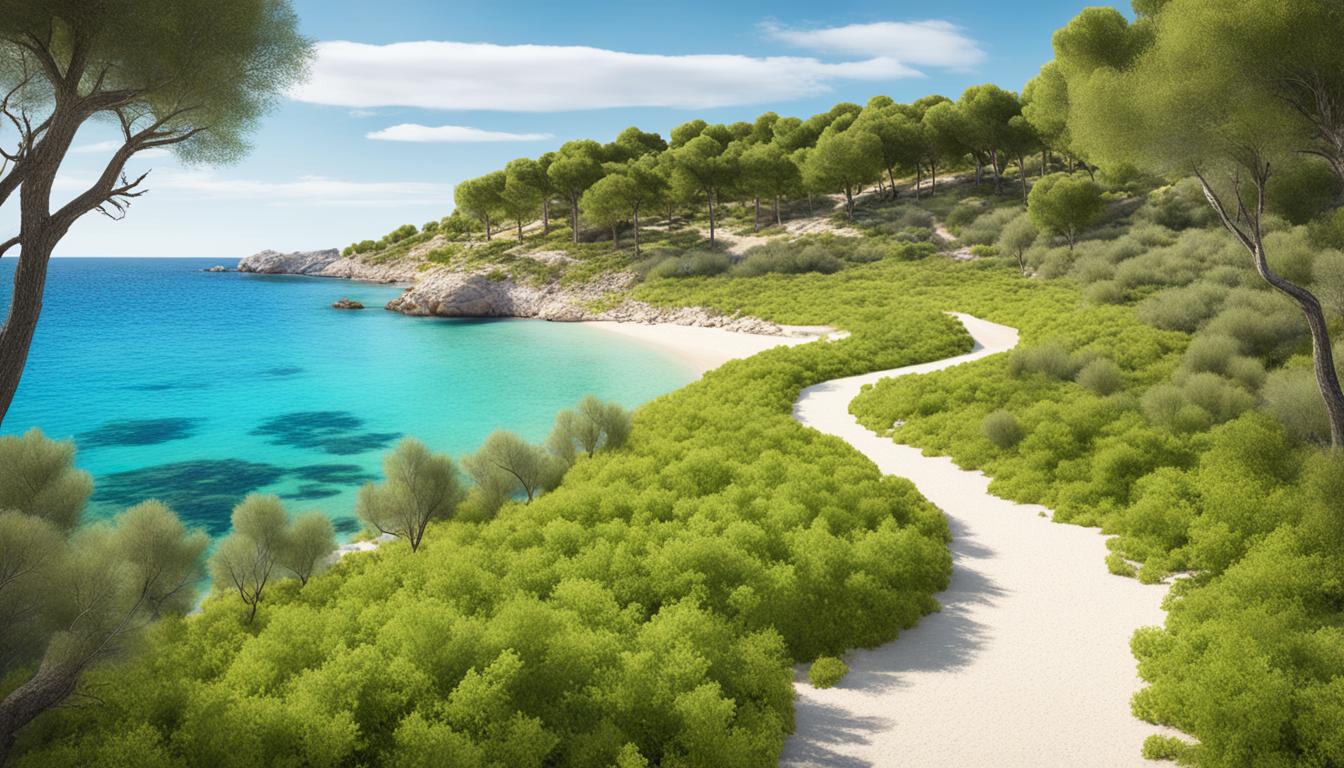The Balearic Islands, like Mallorca, Ibiza, Formentera, and Menorca, are Europe’s top tourist spots. They’re famous for their beautiful beaches, sunny weather, and charming hotels. But, too many visitors have raised concerns about overtourism and the need to protect nature and local life. So, the Balearic authorities have started new rules to make tourism more sustainable.
The Balearic Islands know how crucial sustainable tourism is for keeping their eco-friendly nature, cultural heritage, and local community strong. They’re using new policies and projects to lead in green destinations and environmental conservation. This sets a good example for other popular tourist places.
Key Takeaways
- The Balearic Islands are pioneering sustainable tourism measures to protect the environment and local communities.
- Authorities have introduced new policies to promote eco-friendly travel and responsible vacationing.
- Initiatives focus on carbon offsetting, plastic reduction, and the use of renewable energy.
- The region is committed to preserving its cultural heritage and engaging with local communities.
- Sustainable tourism is emphasized as a means of safeguarding the Balearic Islands’ natural wonders for future generations.
The Balearics Commit to Sustainable Tourism
The Balearic Islands, a top spot for tourists in Spain, have made a big move towards sustainable tourism. In 2022, they welcomed about 16.5 million visitors, just like before the pandemic in 2019. To handle the many tourists and keep the islands beautiful and rich in culture, they’ve started new projects.
The Sustainable Tourism Tax
The Impuesto del Turismo Sostenible (ITS), or Sustainable Tourism Tax, is a key part of these efforts. It makes visitors pay between €1 and €4 per night in tourist spots. This money goes to projects that help protect the environment, fix cultural sites, and support ecotourism. Over 60 projects are happening in Mallorca, like fixing old landmarks and bettering water treatment.
| Region | Visitor Numbers in 2022 |
|---|---|
| Balearic Islands | 16.5 million |
| Andalucía | 30.7 million |
| Canary Islands | 14.5 million |
The Balearic Islands are leading the way in sustainable tourism. They use the sustainable tourism tax and other efforts to make tourism better for the planet and culture.
Limiting New Tourism Accommodations
The Balearic Islands have made a big move to protect their nature and local communities from too many tourists. They’ve banned new hotels and Airbnb rentals until at least 2026. This is part of their plan to balance tourism with protecting the environment and culture.
Now, existing places to stay can only get bigger by up to 15%. They also have to cut the number of beds by 5%. This helps control how many people can visit and uses resources better.
The government has also looked after the workers in tourism. They made a rule that four- and five-star hotels must have lift-up beds. This helps prevent injuries and overwork among the cleaning staff.
| Sustainable Tourism Initiatives in the Balearic Islands | Key Achievements |
|---|---|
| Ban on new hotel and tourist accommodation construction until 2026 | Limits overall tourism capacity and protects natural landscapes |
| Requirement to reduce beds in existing accommodations by 5% | Encourages more efficient use of resources and reduces overcrowding |
| Mandate for lift-up beds in four- and five-star hotels | Improves working conditions and reduces injuries for housekeeping staff |
The Balearic Islands are leading the way in sustainable tourism. They focus on keeping their nature and communities safe from too many visitors. By controlling new hotel construction, tourist accommodation restrictions, Airbnb regulations, and local worker protection, they’re making tourism better for everyone. This way, the islands can be enjoyed by future generations too.
Reducing Pollution and Noise
The Balearic Islands have taken steps to tackle pollution and noise. Formentera limits vehicle access during busy times since 2019. Non-Balearic visitors must get and pay for permits to drive cars or bikes. Menorca is thinking about doing the same.
To visit the Parc Nacional Marítim-Terrestre de l’Arxipèlag de Cabrera in Mallorca, you need to book ahead. Only 200 to 300 people can enter daily in the high season. This rule helps protect the park and lessen tourism’s effect on it.
Vehicle Access Limitations
The islands have set limits on how many alcoholic drinks resorts can serve in Ibiza and Mallorca. This move aims to reduce noise and bother for locals. It shows the Balearic Islands’ effort to meet tourism needs without harming residents or the environment.
| Sustainable Initiative | Impact |
|---|---|
| Limiting vehicle access in Formentera and Menorca | Reduces pollution and noise from vehicular traffic |
| Permit system for visiting the Parc Nacional Marítim-Terrestre de l’Arxipèlag de Cabrera in Mallorca | Preserves the natural environment and limits the impact of tourism |
| Limits on alcoholic drinks at all-inclusive resorts in Ibiza and Mallorca | Helps to curb noise and disturbance in local communities |
These actions show the Balearic Islands’ dedication to tourism and protecting the environment and locals.
Alcohol Limits and Sustainable Practices
The Balearic Islands have taken a bold step to reduce alcohol use in tourism. They’ve set strict rules on alcohol sales and are pushing for sustainable practices in hotels and tourism spots.
Since January 2020, Mallorca has banned Happy Hour, pub crawls, and all-you-can-drink deals. It also limits alcohol sales at certain times. Plus, all-inclusive resorts can only serve six drinks per day. These rules aim to stop binge drinking and excessive partying in places like Magaluf and Arenal de Palma.
The islands are also promoting eco-friendly actions. Hotels like Iberostar and Meliá have stopped using single-use plastics. They offer a “Green Choice” program, letting guests choose not to have their towels and sheets changed every day.
This is part of a big plan to make the islands the world’s first circular destination. They’re tackling waste, pollution, and climate change. By mixing alcohol rules with green efforts, the Balearics are leading the way in responsible and eco-friendly tourism.
| Sustainable Hotel Practices | Eco-Friendly Initiatives |
|---|---|
| Banning single-use plastics | Implementing sustainable alternatives |
| “Green Choice” program for guests | Reducing waste and pollution |
| Reducing daily linen and towel changes | Addressing climate change |
“The new laws in Mallorca, implemented in January 2020, included several restrictions: banning Happy Hour, pub crawls, all-you-can-drink pricing, party boats advertising, alcohol sales at specific hours, and limiting drinks at all-inclusive resorts to six per day.”
The Balearic Islands are leading the way in responsible tourism. They’re combining alcohol rules with green actions. This ensures a better experience for both visitors and locals.
Promoting Off-Season and Cultural Tourism
The Balearic authorities aim to make the islands a year-round destination. They want to move away from the busy summer months. By promoting activities like running, walking, and cycling, they encourage visitors to visit in the off-season. This helps reduce the strain on resources and the environment.
The Balearics have invested in better public transport, like the new Vueling flight from London to Menorca. This makes it easier for travelers to get to the islands all year round. It’s a step towards sustainable travel.
The Balearics are also focusing on cultural tourism. They want visitors to connect with local communities and support sustainable practices. Activities like cheese-making and foraging for hierbas let tourists experience the islands’ traditions. This helps preserve the culture and supports local economies all year.
“The Balearics are committed to positioning themselves as a premier off-season tourism destination, offering a wide range of cultural tourism experiences that showcase the islands’ unique natural and historical assets.”
The goal is to offer a variety of tourism options and promote year-round activities and sustainable transportation. This approach aims for a balanced and eco-friendly visitor experience. It will help protect the islands and support local communities and businesses all year.
Sustainable Tourism in the Balearic Islands
The Balearic Islands are leading the way in sustainable tourism. They have a strong plan to protect their nature and culture. This plan helps balance tourism with the environment and community.
The Sustainable Tourism Tax has brought in €204 million in a few years. This money goes to projects for heritage, the environment, and the community.
To lessen tourism’s impact, the Balearics have set strict rules. No new hotels or tourist spots can be built until 2026. Existing places must cut the number of beds by 5% and can only expand by 15%.
They’re also working to reduce pollution and noise. On Formentera, non-Balearic visitors need permits and pay a daily tax in high season. In Ibiza and Mallorca, all-inclusive resorts have alcohol limits to keep noise down and protect nature.
The islands are pushing for tourism all year round and cultural tourism. They offer year-round flights and projects like the Mill Sponsorship project in Majorca. This project aims to fix over 1,000 traditional mills, helping to spread visitors out and keep culture alive.
| Destination | Annual Visitors (2022) |
|---|---|
| Balearic Islands | 16.5 million |
| Andalucía | 30.7 million |
| Canary Islands | 14.5 million |
The Balearic Islands are working to be the world’s first circular destination. They’re tackling waste, emissions, and resource use with new ideas and community help. By focusing on sustainable tourism, natural environment protection, and cultural heritage preservation, they’re setting a high standard for tourism.

Ibiza’s Shift Towards Sustainable Practices
Ibiza, known for its lively parties, is changing to be more eco-friendly. The island wants to keep its fun vibe but also protect the environment. It’s starting with green projects to lessen tourism’s effect on nature.
Green Initiatives in Ibiza
One big goal is to reduce noise. New rules now limit loud outdoor music and beach clubs. This helps make the island quieter for everyone.
Ibiza also said no to single-use plastics. This move shows its dedication to cutting down on waste and protecting nature.
Now, Ibiza is focusing on renewable energy. It’s using the sun’s power to lessen its use of fossil fuels and cut down on pollution. Tourist spots are also changing to use less water and switch from oil to cleaner energy sources. This helps reduce CO2 emissions and supports green tourism.
These steps, along with the Balearic government’s support for sustainable growth, show Ibiza’s commitment to a greener tourism industry. Ibiza’s move towards eco-friendliness is inspiring for other places to follow.
“The Balearic Islands’ success in tourism is attributed to their excellent infrastructure, first-class agri-food industry, and high-quality service sector, key elements that strengthen trade connections with UK travel and food partners.”
Exploring Ibiza’s Eco-Tourism Offerings
Ibiza is more than just a party spot. It’s a place for eco-tourism and sustainable travel. The island is home to a community of holistic practitioners. They offer wellness retreats with yoga, detoxes, and nutrition programs.
There are also active holidays like hiking, trail running, kayaking, and e-bike tours. These activities let you see Ibiza’s beautiful nature up close.
Eco-farm retreats and farm-to-table dining let you connect with the island’s farming roots. You can support local food systems and enjoy Ibiza’s unique tastes. These activities help reduce the island’s environmental impact and keep its beauty for the future.
| Eco-Tourism Offerings in Ibiza | Sustainable Practices |
|---|---|
|
|
Ibiza is a top spot for sustainable holidays, right after Rhodes. It scored 64 out of 100 in sustainable tourism. The island is leading in eco-friendly efforts, like cutting carbon emissions and protecting nature.
“Ibiza Sostenible” platform involves public bodies, institutions, and companies on the island, working towards the United Nations’ plans for the sustainable development of Ibiza by 2030.
The Balearic Islands, including Ibiza, are focusing on sustainability. This means visitors can enjoy the island’s beauty and culture while being eco-friendly.

Funding Sustainability Through Tourism Taxes
The Balearic Islands have taken a bold step towards sustainable tourism with a new tax. Since 2016, this tax has been key for protecting the environment, preserving culture, and saving marine life.
In 2022, this tax brought in €24.5 million. This money helped fund 46 projects. These projects protected the Posidonia Oceanica seagrass and restored historic sites and trails.
This tax, costing between €1 to €4 per day per person, has been a success. It directs money back into protecting the islands’ beauty and culture. This approach supports sustainability and responsible tourism.
Other places like the Netherlands, New Zealand, and Quintana Roo in Mexico use similar taxes too. They follow the Balearics’ example, showing how tourism taxes can make a big difference. These taxes help support sustainable tourism and protect the environment.
“The Sustainable Tourism Tax has been a game-changer for the Balearic Islands, allowing us to invest in critical environmental and cultural preservation projects that will benefit both residents and visitors for years to come.”
The Balearic Islands’ tax on tourism is a model for the world. It shows how tourism can fund sustainable projects and protect heritage.
Conclusion
The Balearic Islands are leading the way in sustainable tourism in Spain. They use the Sustainable Tourism Tax and other measures to tackle environmental and social issues. This includes limiting new tourist spots, reducing pollution, and promoting visits during off-peak seasons.
They encourage eco-friendly actions from businesses and support renewable energy. They also teach visitors how to vacation responsibly. This makes the Balearics a model for sustainable travel worldwide.
“Approximately 80% of respondents in a 2019 survey expressed interest in visiting destinations for eco-friendly tours in Mallorca.”
More people are choosing eco-friendly travel and responsible vacationing in the Balearic Islands. They focus on keeping the islands beautiful and preserving their culture. This sets a high standard for sustainable tourism models globally.
The Balearic Islands are showing how to manage tourism’s effects on the environment and communities. They balance economic growth with protecting nature and culture. By adopting a sustainable tourism model, they’re leading the way to a greener future for travelers and locals alike.
Exploring the Balearics’ Sustainable Future
The Balearic Islands are leading the way in sustainable tourism. They show us what it means to travel responsibly. With strong measures in place, they’re keeping their beautiful landscapes and cultural treasures safe for the future.
They’ve introduced a Sustainable Tourism Tax that has brought in over 396 million euros since 2016. This money goes towards green projects. The islands are limiting new hotels, cutting down on pollution, and boosting tourism during off-peak seasons and cultural events. This balance helps the economy grow while protecting the environment.
More and more, travelers want to visit places that are good for the planet. The Balearics offer many ways to connect with locals, enjoy nature, and support green efforts. You can join wellness retreats, go on outdoor adventures, or try farm-to-table food. The Balearics show us how to travel sustainably, setting an example for others to follow.

